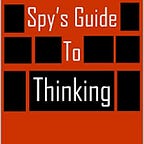What The Best Novelists Do
When you’re a spy, your job is to answer questions.
The questions could be about an enemy’s war plans. Or about their diplomatic initiatives. Or their intent to get a new weapon.
You use a spy’s tools to gather data that answers those questions. The intelligence you collect is combined and evaluated in an analytic process. The analysis is used to make a decision and take action. The process looks like this:
It all starts with the decision-maker’s questions. With those questions, you go out and find the answers (for more on the art of answering questions, see this).
The best novelists are also focused on questions.
Not study guide questions. Not classroom questions. The best novelists know their job is to frame and answer questions about the world.
In Anna Karenina, Tolstoy frames a lot of questions. There are questions about marital fidelity, standing in society, and how life should be lived. Lots of important questions about the world. Among the questions are: How should we be true to the land, each other and ourselves?
In Anna Karenina, the answers involve suffering. But that’s because Tolstoy was writing for a Russian audience. A Russian audience who thinks answers aren’t satisfying if they don’t involve suffering.
Along the way, Tolstoy makes you wonder. When he has you wondering, you’re feeling. Your question doesn’t even have words yet. Then, he gives you words for some of your questions. And finally, he answers them.
In The Adventures of Huckleberry Finn, Mark Twain gives readers a different set of questions. Questions important to 19th century Americans such as, What should be the relationship between white and black races? What’s the right way to handle con men and despots? In a world where everyone lives by their wits, how should you be ethical?
In The Adventures of Huckleberry Finn, the answers are subversive. Because he was writing for an American audience. An American audience who loves subversive answers.
The best novelists know their readers have questions. And they know their readers need questions answered in a satisfying way.
Which means the best novelists think about where their readers’ questions are coming from. They think about the decisions their readers are considering. They think about the actions their readers will take. They look at their readers like they’re decision-makers asking questions:
In my short novel The 24th Name, the first questions are plot-related. They are: What happened to the girl? The second question is how did the main character go from being a spy to being an ex-spy looking for a girl? Along the way are lots of other practical questions, such as: What’s the best way to fight in an elevator?
Beyond those practical and plot questions are questions like: How do I think in a structured way? How do I figure out someone else’s strategy? What’s the smart way to take risks? (These questions are answered in a different context in The Adventures of Young John Quincy Adams).
Some people don’t like the answers. But a lot of people do, according to the reviews.
The next time you read a novel, think about the questions that pop into your head. Ask yourself which questions were answered. Ask yourself if you’re satisfied with the answer. If you’re not satisfied, maybe the novelist raised questions that weren’t answered. Or maybe the answers weren’t good.
Whatever the case, the best novelists put those questions there on purpose.
And if you’re a novelist, ask yourself: What questions am I putting in readers’ heads?
— — —
For more on writing, see “A Mistake Writers Make.”
For more on the Data-Analysis-Decision-Action process, see A Spy’s Guide To Thinking.
For more answers to strategic questions, see A Spy’s Guide To Strategy.
For more on how to take smart risks, see A Spy’s Guide To Taking Risks.
